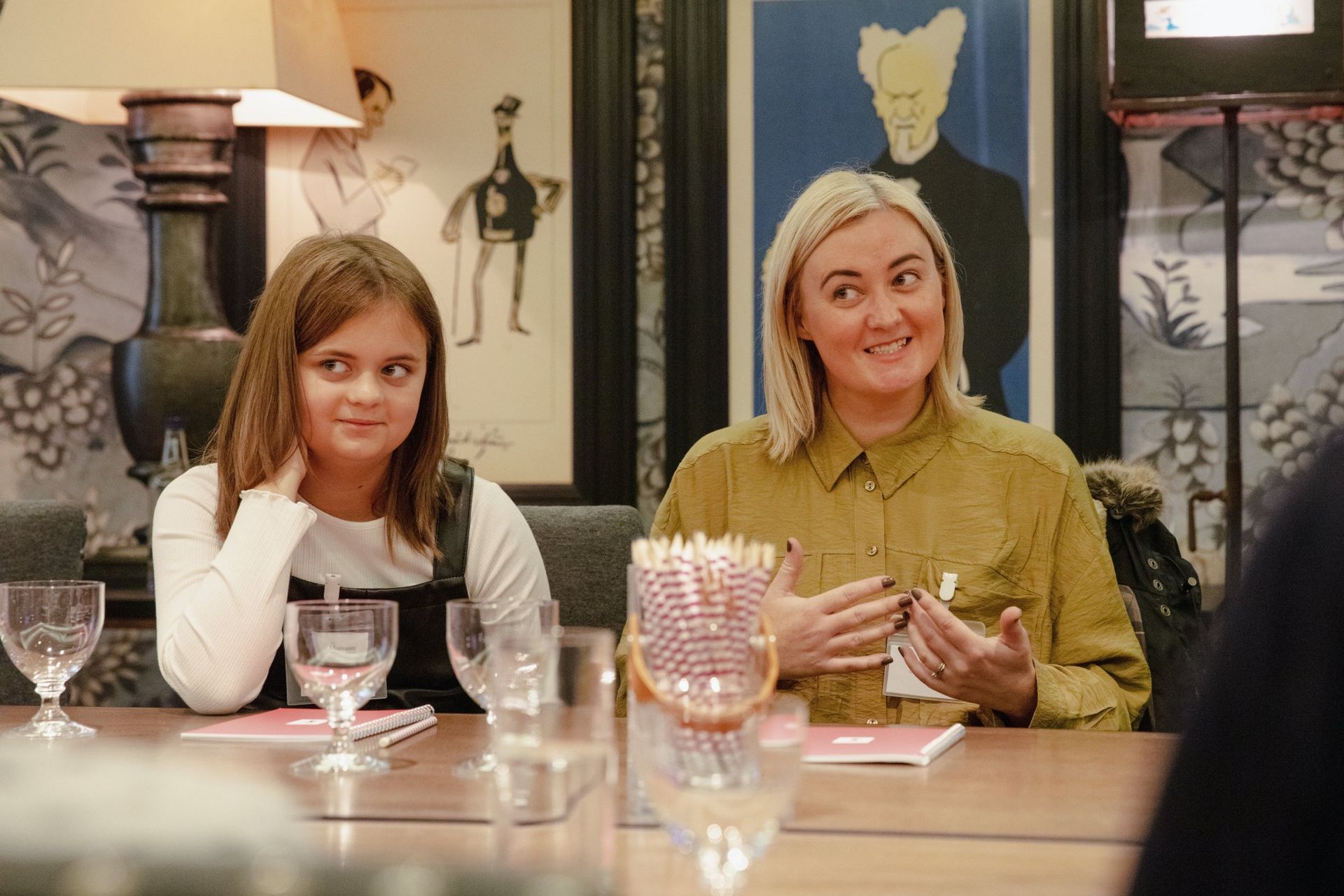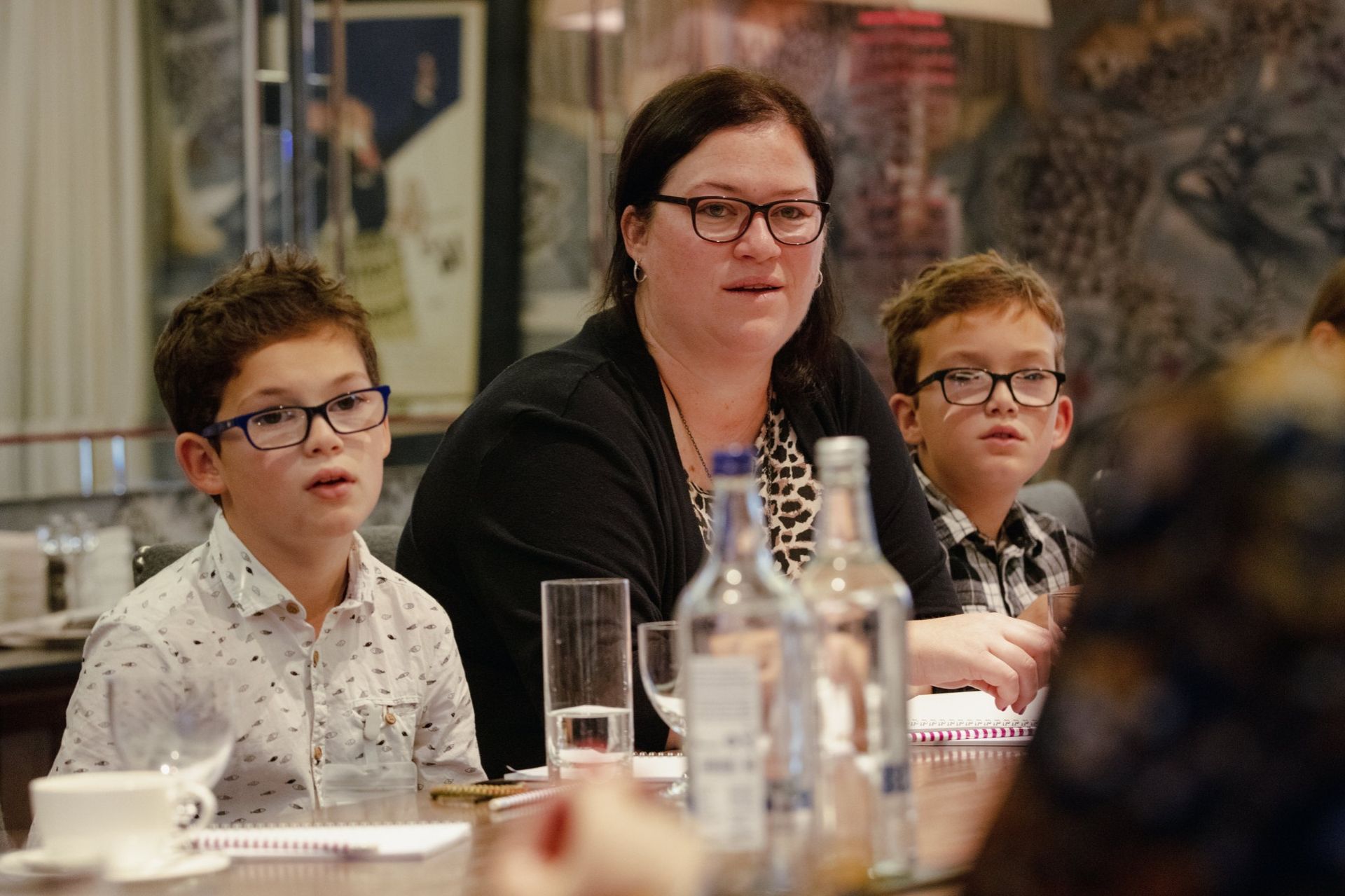尊敬的用戶您好,這是來自FT中文網的溫馨提示:如您對更多FT中文網的內容感興趣,請在蘋果應用商店或谷歌應用市場搜尋「FT中文網」,下載FT中文網的官方應用。
How much have you talked to your children about the cost of living crisis?
關於生活成本危機,你和你的孩子談過多少次?
Our instinct as parents is to shield our children from the financial problems of the adult world, but it’s getting harder to do.
作爲父母,我們的本能是保護我們的孩子遠離成人世界的經濟問題,但這越來越難做到。
Even if your family has been able to absorb the impact of rising prices, children are picking up on news reports about soaring bills, strikes over pay and political upheaval.
即使你的家庭已經能夠承受物價上漲的影響,孩子們也會從新聞報導中瞭解到賬單飆升、工資罷工和政治動盪。
While younger children might be blissfully unaware, older children may have overheard their parents fretting about mortgage rates, the
weekly shop or how household budgets might need trimming.
雖然年幼的孩子可能懵然不知,但年長的孩子可能已經聽到他們的父母在爲抵押貸款利率、每週購物或家庭預算可能需要削減而煩惱。
How included should they be in these conversations? Parents don’t want children to worry, but as mortgage costs soar, even fairly affluent families are cutting treats, and don’t want children to feel this is somehow their fault.
他們應該如何參與這些對話?父母不希望孩子們擔心,但隨著抵押貸款成本的飆升,即使是相當富裕的家庭也在削減開支,而且不希望孩子們覺得這在某種程度上是他們的錯。
“My 10-year-old daughter Maddie is very aware of what’s going on as she overhears us talking, but I still want her to be a kid,” says Katie Handsley, a clerical worker from Aberdeen. “As much as we’d like to give her everything in the world, it’s just not possible in the current climate. But I also want her to know we’re not being horrible when we say no; there’s a reason behind it.”
來自阿伯丁的一名職員凱蒂·漢德斯利(Katie Handsley)說:「我10歲的女兒麥迪在無意中聽到我們的談話時,非常清楚發生了什麼,但我還是希望她還是個孩子。儘管我們很想給她世界上的一切,但在目前的氣候下這是不可能的。但我也想讓她知道,當我們說不的時候,並不是我們想對她不好;這是有原因的。」
For older children, the financial pressures move beyond
pocket money. Wealth managers say that falling investment values combined with cost of living pressures could affect the ability of Bomad (the Bank of Mum and Dad) to provide property deposits for adult offspring. Plus, the
high cost of childcare means that Nomad (the Nursery of Mum and Dad) is increasingly being relied upon to look after the grandchildren
gratis. 對於大一點的孩子來說,經濟壓力不僅僅是零花錢。理財經理們表示,投資價值不斷下降,再加上生活成本壓力,可能會影響Bomad(父母銀行)爲成年後代提供房產存款的能力。此外,高昂的托兒費用意味著,越來越多的人依賴Nomad(父母的託兒所)來免費照顧孫輩。

Takeaways are off the menu for Maddie Handsley and mother Katie:

麥迪·漢德斯利(Maddie Handsley)和母親凱蒂的菜單上沒有外賣:
Pocket money
零花錢
The cost of living crisis has blighted the financial lives of millions of families, and prompted children to ask many questions about money.
生活成本危機已經破壞了數百萬家庭的財務生活,並促使孩子們問了許多關於錢的問題。
“Money touches every single part of our lives, and if you hide it or shelter your kids from it, you’re not going to be helping them in future,” says Louise Hill, co-founder of gohenry, a children’s savings app.
兒童儲蓄應用gohenry的聯合創辦人路易絲•希爾(Louise Hill)表示:「金錢涉及我們生活的方方面面,如果你把錢藏起來或讓孩子遠離它,你在未來就不會幫助到他們。」
There have been clear changes in pocket money spending, according to data sourced from over 435,000 UK children using gohenry’s prepaid contactless cards.
根據來自43.5萬多名使用gohenry預付費非接觸式卡的英國兒童的數據顯示,他們的零花錢支出發生了明顯的變化。
The majority of 6 to 18-year-olds spent much less on “non-essentials” in the first half of 2022 than a year previously. Categorised by merchant, the amount children spent fell by 32 per cent on toys, 14 per cent on fashion and clothing, and 11 per cent on online gaming.
2022年上半年,大多數6至18歲的年輕人在「非必需品」上的支出比去年同期少得多。按商家分類,兒童在玩具上的支出下降了32%,在時裝和服裝上的支出下降了14%,在網絡遊戲上的支出下降了11%。
32%Percentage of children who spent less on toys in the first half of 2022, among gohenry’s 435,00 customers
32%在gohenry的4.35萬名顧客中,2022年上半年在玩具上花費較少的兒童比例
However, the number of children using their cards to spend on “essential” categories such as supermarkets increased by 17 per cent, suggesting more are using pocket money to buy food and everyday items.
然而,使用他們的卡在超市等「必要」類別上消費的兒童數量增加了17%,這表明更多的人在使用零花錢購買食品和日常用品。
The amounts that children are saving has also risen by just over 14 per cent in the same period, suggesting that more of them are targeting bigger purchases.
同期,孩子們的儲蓄金額也上升了14%多一點,這表明他們中有更多的人打算購買更多的東西。
Michelle Dickson, a local government administrator from Weston-super-Mare, uses gohenry cards with her two sons Liam, 10, and Benjamin, 7, as a way of teaching budgeting. Her own budget has been under pressure, but she hasn’t had direct conversations with her sons about the war in Ukraine or why inflation is soaring.
蜜雪兒•迪克森(Michelle Dickson)是Weston-super-Mare的一名地方政府行政人員,她和兩個兒子——10歲的利亞姆(Liam)和7歲的本傑明(Benjamin)——用gohenry卡來教孩子們做預算。她自己的預算也面臨壓力,但她沒有和兒子們直接討論烏克蘭戰爭或通貨膨脹飆升的原因。
“They hear a lot about the cost of living in the news and a little bit at school, but I don’t want to scare them,” she says.
她說:「他們在新聞中聽到了很多關於生活成本的訊息,在學校裏也聽到了一些,但我不想嚇到他們。」
“Mum’s always saying don’t leave the lights on, or don’t turn on the heating,” says Liam.
利亞姆說:「媽媽總是說不要開著燈,也不要開暖氣。」
Seven-year-old Benjamin saved up for months to buy a pair of rollerblades. He was happy to buy them, but “felt sad” when he saw all the money had gone from his account.
7歲的本傑明攢了好幾個月的錢買了一雙旱冰鞋。他很高興買了它們,但當他看到所有的錢都從他的賬戶中消失時,「感到很難過」。
One thing is certain — whether or not we talk to our children about the cost of living, they’re picking up how concerned we are. Nearly three-quarters of 2,000 children and teenagers surveyed by gohenry said they were worried about the cost of living crisis, including rising food and energy bills.
有一件事是肯定的——無論我們是否和孩子們談論生活成本,他們都會意識到我們有多關心生活成本。gohenry調查的2000名兒童和青少年中,有近四分之三的人表示,他們擔心食品和能源價格上漲等生活成本危機。
71%Percentage of children and teenagers worried about the cost of living crisis. Survey of 2,000 youngsters by gohenry
71%擔心生活成本危機的兒童和青少年比例。gohenry對2000名年輕人進行了調查
Nearly 8mn Britons are finding it a “heavy burden” to keep up with their bills, up from 5mn in 2020,
according to the UK financial regulator. More than 4mn people have missed a bill or credit card payment in more than three of the past six months, and charities expect distress levels to increase over the winter.
根據英國金融監管機構的數據,近800萬英國人發現支付賬單是一個「沉重的負擔」,高於2020年的500萬。在過去6個月裏,有超過3個月的時間裏,超過400萬人錯過了賬單或信用卡付款,慈善機構預計,在冬季,這種痛苦程度將會增加。
Even if more affluent households have absorbed rising costs, children are aware that their friends and classmates are being affected.
即使更富裕的家庭已經吸收了上漲的費用,孩子們也知道他們的朋友和同學正在受到影響。
Michelle says the main change for the Dickson family is no more foreign holidays. “You worry the kids will ask how come [our friends] can have a trip to Disneyland or a brand new PlayStation and we can’t?”
蜜雪兒說,迪克森一家最大的變化就是不再去國外度假了。「你擔心孩子們會問,爲什麼(我們的朋友)可以去迪士尼樂園旅行,或者可以買一臺全新的PlayStation遊戲機,而我們卻不能?」
Katie has told her daughter that expectations for Christmas presents “need to be different this year” and the family has cut back on eating out.
凱蒂已經告訴她的女兒,對聖誕禮物的期望「今年要有所不同」,而且全家已經減少了外出就餐。
“We used to get a takeaway every Saturday, but the cost for the three of us has gone from £23 to £36,” she says. Instead, she and her 10-year-old daughter have been finding recipes for “Fakeways” on TikTok, and Maddie proudly tells me about making egg fried rice with her mum: “It was so fun.”
她說:「我們過去每週六都叫外賣,但我們三個人的花費已經從23英鎊漲到了36英鎊。」相反,她和10歲的女兒一直在TikTok上尋找「Fakeways」的食譜,麥迪自豪地告訴我,她和媽媽一起做雞蛋炒飯:「太有趣了。」
Of the 2,000 children and teenagers surveyed, one in three said they would happily go without having treats or new toys for a month if this helped their families pay for essentials. In real life, millions of other children don’t have a choice.
在接受調查的2000名兒童和青少年中,三分之一的人表示,如果這能幫助他們的家庭支付必需品,他們會很樂意在一個月內不喫零食或新玩具。在現實生活中,數以百萬計的其他孩子別無選擇。
One colleague recently had a heart-to-heart with his son after he found him sitting in the dark playing computer games as he was “trying to save money”.
一位同事最近發現他的兒子坐在黑暗中玩電腦遊戲,因爲他「想省錢」,於是與他的兒子進行了一次談話。
Some parents who contacted me on social media say they don’t watch the news as they don’t want their children to have nightmares about energy blackouts, recession or the prospect of nuclear war.
一些在社群媒體上與我聯繫的家長說,他們不看新聞,因爲他們不想讓孩子做關於能源短缺、經濟衰退或核戰爭前景的噩夢。
Another was angry that “the 0.01 per cent of privileged kids are actually having to have it explained to them what the cost of living crisis is,” adding: “The struggle is real!”
另一位家長則憤怒地表示,「那0.01%的特權階層孩子實際上不得不讓人向他們解釋生活危機的成本是什麼」,並補充道:「這種鬥爭是真實的!」
Other parents were eager to reassure their children, but also wanted them to realise how privileged they are.
還有一些父母急於安撫自己的孩子,但也希望他們意識到自己是多麼的幸運。
“I spend time reassuring my children about how we are coping by giving them a budget that they can decide how to spend on their own treats,” one mum says. “On Halloween night, I noticed they were very generous with the candy and satsumas they gave out as they were worried some of the other kids might not have had treats for a while.”
一位母親說:「我花時間安撫我的孩子們,告訴他們我們是如何應對的,給他們一個預算,讓他們自己決定怎麼花在自己的零食上。在萬聖節的晚上,我注意到他們非常慷慨地分發糖果和小蜜桔,因爲他們擔心其他孩子可能有一段時間沒有喫的了。」

Turning out the lights: Benjamin, left, and Liam Dickson, with mother Michelle

關燈:本傑明(左),利亞姆•迪克森和母親蜜雪兒
Financial lessons
財務課程
In the classroom, children are more eager than ever to learn about money.
在課堂上,孩子們比以往任何時候都更渴望學習金錢知識。
“What we see, particularly with younger children, is that they’re asking questions about things they’re seeing and hearing in the news,” says Rebekah Young, senior fundraising manager at MyBnk, a financial education charity.
金融教育慈善機構MyBnk的高級籌款經理麗貝卡•楊(Rebekah Young)表示:「我們看到的情況是,他們對自己在新聞中看到和聽到的事情會提出疑問,這一點在年齡較小的孩子身上尤爲明顯。」
‘What is inflation?’ is a common question she hears; but since the “mini” Budget, even year 7 children have been quizzing her about tax and national insurance.
「什麼是通貨膨脹?」這是她經常聽到的一個問題;但自從「迷你」預算出臺以來,甚至連七年級的孩子都在問她有關稅收和國民保險的問題。
“Children are trying to draw connections between what they’re seeing in the news, and what these things actually mean for them,” she says. “It’s important to have conversations when you’re going around the supermarket making purchasing decisions, and how to tell the difference between a want and a need.”
「孩子們試圖將他們在新聞中看到的東西與這些東西對他們的實際意義聯繫起來,」她說。「當你在超市裏做購買決定,以及如何區分想要的和需要的時候,交談是很重要的。」
Sixteen-year-old Lucy Roche from Dublin has learned a lot about inflation at college, as she’s studying business — but she’s aware most of her friends know nothing. “It didn’t feel too relevant when we first learned about it, but now it’s coming in handy,” she says.
來自都柏林的16歲的露西·羅奇(Lucy Roche)在大學裏學到了很多關於通貨膨脹的知識,因爲她正在學習商業--但她知道她的大多數朋友都一無所知。她說:「當我們第一次瞭解它時,它感覺不太相關,但現在它派上了用場。」
She and her friends have noticed how clothes prices are rising fast, but are using apps such as Depop and Etsy to buy and sell clothing. “There are no careless purchases now,” she says.
她和她的朋友們已經注意到衣服價格上漲得很快,但他們正在使用Depop和Etsy等程式買賣衣服。她說:「現在沒有人會隨便買東西了。」
Others say they are encouraging their children to watch the news, and using this to start conversations about money.
另一些人則表示,他們鼓勵孩子看新聞,並藉此開始談論金錢。
“My nine-year-old daughter has really got involved with the news, and understands about the effects the war in Ukraine is having,” says FT reader Dija Ayodele.
英國《金融時報》讀者Dija Ayodele表示:「我9歲的女兒真的很關注新聞,她瞭解烏克蘭戰爭的影響。」
“I run a business, and it really hit home for her when I had to make staff redundant — she saw a clear link then. My husband has schooled her on the electricity bill and she’s now the smart meter monitor.”
「我經營著一家企業,當我不得不裁員時,這對她打擊很大——她看到了其中明顯的聯繫。我丈夫教她注意電費,現在她簡直就是個智慧電錶監控器。」
Michelle’s two sons are both keen footballers, which means football boots are an expensive necessity — although they cancelled their subscription to Match of the Day magazine after the price increased. “We use Vinted and eBay to buy secondhand football boots, and the boys sell their old ones too,” she says.
蜜雪兒的兩個兒子都是足球愛好者,這意味著足球鞋是一種昂貴的必需品——儘管在價格上漲後,他們取消了訂閱《每日比賽》雜誌。她說:「我們用Vinted和eBay買二手足球靴,孩子們也賣舊的。」
Liam tells me he’s been shopping around online for bargains. “I recently bought a magnet pen for £5, but the first one I saw was £15,” he says.
利亞姆告訴我他一直在網上買便宜貨。他說:「我最近花5英鎊買了一支磁鐵筆,但我看到的第一支要15英鎊。」
Does he know the difference between a “want” and a “need”?
他知道」想要「和」需要「之間的區別嗎?
“A need is spending money on electricity, broadband and clothing — but not fancy, branded clothing,” he says.
他說:「人們需要花錢買電、寬頻和服裝,但不是花俏的名牌服裝。」
And what’s a luxury? “Espresso pods,” he says. “No, those are definitely a need!” says his mum. Even so, she’s saving money buying dented and less-than-perfect pods via the
Odd Coffee Company.
Just giving
只是給予
All the parents who contributed to this article recognise that, while they have to cut back, many others are in a far worse position.
所有爲本文投稿的父母都認識到,雖然他們必須削減開支,但許多其他人的情況要糟糕得多。
Many are actively involving their children when making donations to food banks. In the words of one of my social media followers: “My nine-year-old is not being brought up in a bubble.”
在向食品銀行捐款時,許多人積極地讓自己的孩子參與進來。用我的一位社群媒體粉絲的話來說:「我9歲的女兒不是在泡沫中長大的。」
256%Increase in donations to charity by gohenry users
A significant shift in children’s spending is charity donations. Amounts given to charity by children using gohenry accounts increased by an astonishing 256 per cent in the first half of 2022 with over £435,000 given to good causes compared with £120,000 the year previously.
兒童支出的一個重要轉變是慈善捐贈。2022年上半年,兒童透過gohenry賬戶向慈善機構捐款的金額驚人地成長了256%,用於慈善事業的捐款超過43.5萬英鎊,而前年爲12萬英鎊。
“When I first saw this data, my instant reaction was that can’t be right, but it is,” says Hill, noting that the figure includes direct donations to charities as well as websites such as JustGiving.com and Change.org.
希爾說:「當我第一次看到這些數據時,我的第一反應是,這不可能是對的,但它是對的。」希爾指出,這個數字包括了對慈善機構的直接捐款以及JustGiving.com和Change.org等網站的捐款。
“It just shows you that children are not only aware of the cost of living crisis, they want to do something about it,” she says.
她說:「這只是表明,孩子們不僅意識到了生活成本危機,他們還想爲此做些什麼。」
Such donations also rose early in the pandemic, but less dramatically. “Customers told us their children realised there were a lot of people out there in worse situations than they were,” she says. “I think we’re seeing the same sentiment here, but on a much greater scale than before.”
這種捐贈在大流行初期也有所增加,但沒有那麼顯著。她說:「顧客們告訴我們,他們的孩子意識到,還有很多人的處境比他們更糟糕。我認爲我們在這裏也看到了同樣的情緒,但規模比以前大得多。」
For every family prepared to talk to their children about budgeting, there are others desperately hiding the fact that they can’t afford to pay bills. Young from MyBnk encountered one child at a school session who asked “My mum says she’s £500 into her overdraft — what does that mean?”
儘管每個家庭都準備和孩子們討論預算問題,但也有一些家庭絕望地隱瞞了他們無力支付賬單的事實。來自MyBnk的楊在一次學校會議上遇到一個孩子,他問:「我媽媽說她透支了500英鎊,這是什麼意思?」
Parents believe it shouldn’t just be their job to explain and argue that lessons about money should be on the curriculum in primary and secondary schools. As they navigate the cost of living crisis, they also wish they had been taught more in school.
家長們認爲,解釋和爭論有關金錢的課程應該出現在中小學的課程中,不應該只是他們的工作。在應對生活成本危機的同時,他們也希望自己在學校裏得到了更多的教育。
“Knowing the value of money is really, really important,” says Young. “These are complex skills, and to be picking up that knowledge at such a young age is going to be hugely beneficial going forwards. But it’s also a worry because not every child will have that opportunity.”
楊說:「瞭解金錢的價值真的非常非常重要。這些都是複雜的技能,在這麼小的年紀就掌握這些知識將對未來大有裨益。」但這也令人擔憂,因爲不是每個孩子都有這樣的機會。」
Adult children tap the Bank of Mum and Dad
As living costs rise, wealth managers say there is increasing evidence that young adults are turning to parents for help.
“Our financial planners aren’t seeing evidence of parents holding back from helping their children out — quite the opposite, in fact,” says Jason Hollands, managing director of Evelyn Partners, a wealth manager.
Some well-off parents have withdrawn investment capital to pay down their children’s mortgages as interest rates rise, while others are making monthly cash gifts from income to assist adult children with the rising cost of living.
This could involve picking up regular direct costs on behalf of adult children such as vehicle payments, school fees and, increasingly, childcare.
Hollands reports that Nomad — the Nursery of Mum and Dad — is doing brisk business. “Many grandparents may be happy to care for their grandchildren for free, reducing the cost of paying for nursery or childminder costs and enabling a son or daughter to work more hours and improve their household earnings,” he says.
“Not everyone is going to be in this situation — with markets down since the start of the year and living costs rising, doubt about the robustness of their finances is going to creep in,” he adds.
With the inheritance tax nil rate band frozen until 2026, more families are eager to make lifetime gifts and start the seven-year clock ticking, fearing the freeze could be extended. However, these decisions are being weighed against the fall in value of investment portfolios and its impact on retirement plans.
“Future tax rises and rising social care costs are definitely another worry in clients’ minds,” says Andrew Wheeler, head of partnership business development at RBC Brewin Dolphin, a wealth manager. “Some people may feel they can’t be as generous as they could be.”
He also knows of parents supporting adult children with mortgage and rental costs as prices rise. “We’re not into full-blown recession yet,” he says. “If it all goes south, never mind the Bank of Mum and Dad — they’ll be coming back to live in the Hotel of Mum and Dad.”
成年的孩子們會從「父母銀行」取款
理財經理們表示,隨著生活成本上升,越來越多的證據表明,年輕人開始向父母尋求幫助。
財富管理公司Evelyn Partners的董事總經理傑森•霍蘭茲(Jason Hollands)表示:「我們的理財規劃師沒有看到父母不願意幫助孩子走出困境的跡象——事實上,情況恰恰相反。」
隨著利率上升,一些富裕的父母撤回了投資資金,以支付孩子的抵押貸款,而另一些父母則從收入中每月拿出現金,幫助成年子女應對不斷上漲的生活成本。
這可能涉及爲成年子女承擔定期的直接費用,如車輛費用、學費,以及越來越多的托兒費用。
霍蘭茲報告說,「父母託兒所」生意興隆。他說:「許多祖父母可能很樂意免費照顧他們的孫子孫女,這減少了支付託兒所或托兒費的成本,使兒子或女兒能夠工作更多時間,提高他們的家庭收入。」
他補充稱:「並非所有人都會陷入這種情況——隨著市場自年初以來下跌,生活成本不斷上升,人們將逐漸對他們的財務穩健產生懷疑。」
隨著遺產稅的零稅率區間被凍結到2026年,越來越多的家庭急切地想要終身贈予,並開始倒計時7年,擔心凍結可能會延長。然而,這些決定要與投資組合價值的下降及其對退休計劃的影響進行權衡。
財富管理公司RBC Brewin Dolphin合夥業務發展主管安德魯•惠勒(Andrew Wheeler)表示:「未來的增稅和社會保障成本上升無疑是客戶擔心的另一個問題。有些人可能會覺得他們不能像他們應該的那樣慷慨。」
他還知道,隨著價格上漲,有些父母用抵押貸款和租金來支援成年子女。「我們還沒有進入全面衰退,」他說。「如果一切都出了差錯,就別管什麼『父母銀行』了——他們會回來住在『父母旅館』裏的。」




